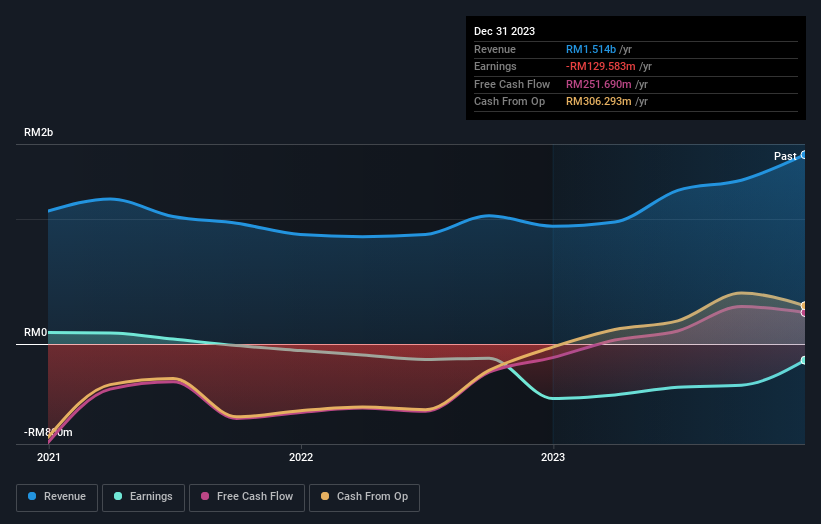Tropicana Corporation Berhad's (KLSE:TROP) top owners are private companies with 46% stake, while 30% is held by insiders
Key Insights
Significant control over Tropicana Corporation Berhad by private companies implies that the general public has more power to influence management and governance-related decisions
A total of 4 investors have a majority stake in the company with 56% ownership
To get a sense of who is truly in control of Tropicana Corporation Berhad (KLSE:TROP), it is important to understand the ownership structure of the business. The group holding the most number of shares in the company, around 46% to be precise, is private companies. In other words, the group stands to gain the most (or lose the most) from their investment into the company.
Individual insiders, on the other hand, account for 30% of the company's stockholders. Large companies usually have institutions as shareholders, and we usually see insiders owning shares in smaller companies.
Let's take a closer look to see what the different types of shareholders can tell us about Tropicana Corporation Berhad.
View our latest analysis for Tropicana Corporation Berhad
What Does The Institutional Ownership Tell Us About Tropicana Corporation Berhad?
Many institutions measure their performance against an index that approximates the local market. So they usually pay more attention to companies that are included in major indices.
Tropicana Corporation Berhad already has institutions on the share registry. Indeed, they own a respectable stake in the company. This can indicate that the company has a certain degree of credibility in the investment community. However, it is best to be wary of relying on the supposed validation that comes with institutional investors. They too, get it wrong sometimes. It is not uncommon to see a big share price drop if two large institutional investors try to sell out of a stock at the same time. So it is worth checking the past earnings trajectory of Tropicana Corporation Berhad, (below). Of course, keep in mind that there are other factors to consider, too.
Hedge funds don't have many shares in Tropicana Corporation Berhad. From our data, we infer that the largest shareholder is Chee Tan (who also holds the title of Top Key Executive) with 23% of shares outstanding. Its usually considered a good sign when insiders own a significant number of shares in the company, and in this case, we're glad to see a company insider play the role of a key stakeholder. In comparison, the second and third largest shareholders hold about 14% and 13% of the stock.
Our research also brought to light the fact that roughly 56% of the company is controlled by the top 4 shareholders suggesting that these owners wield significant influence on the business.
Researching institutional ownership is a good way to gauge and filter a stock's expected performance. The same can be achieved by studying analyst sentiments. We're not picking up on any analyst coverage of the stock at the moment, so the company is unlikely to be widely held.
Insider Ownership Of Tropicana Corporation Berhad
The definition of an insider can differ slightly between different countries, but members of the board of directors always count. The company management answer to the board and the latter should represent the interests of shareholders. Notably, sometimes top-level managers are on the board themselves.
I generally consider insider ownership to be a good thing. However, on some occasions it makes it more difficult for other shareholders to hold the board accountable for decisions.
Our information suggests that insiders maintain a significant holding in Tropicana Corporation Berhad. Insiders own RM851m worth of shares in the RM2.8b company. It is great to see insiders so invested in the business. It might be worth checking if those insiders have been buying recently.
General Public Ownership
With a 18% ownership, the general public, mostly comprising of individual investors, have some degree of sway over Tropicana Corporation Berhad. This size of ownership, while considerable, may not be enough to change company policy if the decision is not in sync with other large shareholders.
Private Company Ownership
We can see that Private Companies own 46%, of the shares on issue. It's hard to draw any conclusions from this fact alone, so its worth looking into who owns those private companies. Sometimes insiders or other related parties have an interest in shares in a public company through a separate private company.
Next Steps:
It's always worth thinking about the different groups who own shares in a company. But to understand Tropicana Corporation Berhad better, we need to consider many other factors. Case in point: We've spotted 3 warning signs for Tropicana Corporation Berhad you should be aware of, and 2 of them are significant.
Of course this may not be the best stock to buy. So take a peek at this free free list of interesting companies.
NB: Figures in this article are calculated using data from the last twelve months, which refer to the 12-month period ending on the last date of the month the financial statement is dated. This may not be consistent with full year annual report figures.
Have feedback on this article? Concerned about the content? Get in touch with us directly. Alternatively, email editorial-team (at) simplywallst.com.
This article by Simply Wall St is general in nature. We provide commentary based on historical data and analyst forecasts only using an unbiased methodology and our articles are not intended to be financial advice. It does not constitute a recommendation to buy or sell any stock, and does not take account of your objectives, or your financial situation. We aim to bring you long-term focused analysis driven by fundamental data. Note that our analysis may not factor in the latest price-sensitive company announcements or qualitative material. Simply Wall St has no position in any stocks mentioned.

 Yahoo Finance
Yahoo Finance 

